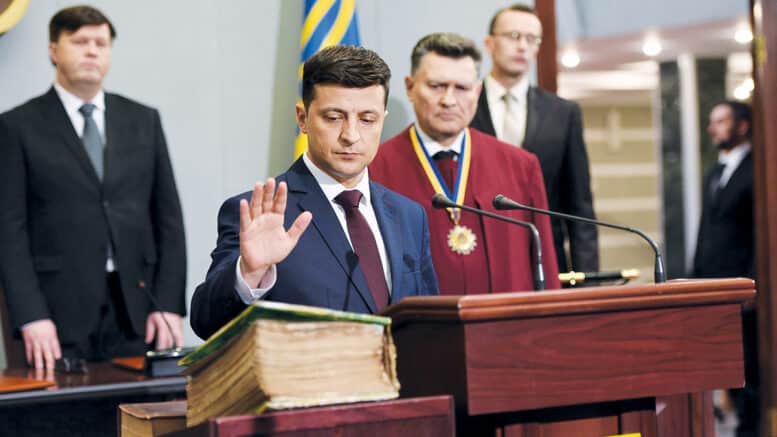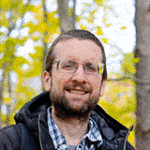Volodymyr Oleksandrovych Zelensky is the current President of Ukraine. He won the 2019 Ukrainian presidential election in a landslide and surprise upset against Petro Poroshonko, the then-incumbent president. Prior to Zelensky’s political career, he was heavily involved in the entertainment industry as a comedian, actor, screenwriter, director, and producer.
Early Life and Education
Volodymyr Zelensky was born January 25, 1978 in Kryvyi Rih, a city southeast of Kyiv in Ukraine. His father, Oleksandr Zelensky, is a computer engineer, while his mother, Rimma Zelenska, is a now-retired engineer. He is Jewish on both sides of his family.
Before entering elementary school, the young Zelensky spent four years in Erdenet, Mongolia, as his father was working there. Most of his life, however, including his full education from elementary to law school, was lived in Ukraine. He studied law in his home town, at the Kryvyi Rih Institute of Economics of the Kyiv National Economic University, where his father was a professor. Although he graduated, he has never perused a career in law. Instead, he has built a highly successful comedy empire.
Early Career
When he was 17, Zelensky participated in a local KVN competition. KVN, an acronym from the Russian “Клуб весёлых и находчивых” (The Club of the Funny and Witty), is a televised show that began under the USSR in which teams compete in comedy writing and improvisation. It was and remains popular over much of the post-soviet space and some of the biggest names in comedy in many post-soviet countries got their start at KVN.
Zelensky was invited to join the united Ukrainian team to compete in KVN’s Major league in Moscow. The team eventually won the league in 1997, but Zelensky played mostly secondary roles. Zelensky created his own team that same year called Kvartal 95, and unlike previously, he now played the main roles.
Above: Zelensky playing one of his most famous skits on KVN: The Man Born Dancing. (Skit in Russian)
Kvartal played in KVN leagues until 2001. In that year they won the Ukrainian League and Zelensky was asked to become a producer for KVN. But, doing so would have meant to abandon his team. Instead, he turned Kvartal 95 into a production company and began to seek direct affiliations with television stations.
His early hits were shows that specialized in political and social satire, produced for the Inter channel. His company later signed an exclusive deal with Inter and Zelensky himself was eventually made a general producer at Inter, greatly expanding his creative powers. He and his company walked away from Inter in 2012, however, apparently due to a difference in politics with the management. Inter was then owned by Valeriy Khoroshkovsky, a former deputy prime minister and close political ally of then-president Yanukovitch, who would be forced to flee the country in the 2014 Maidan Revolution.
Kvartal 95 and Zelensky then signed on with 1+1, a station owned by another controversial oligarch, Igor Kolomoisky, who gained in political power as an ally of the Maidan Revolution.
Zelensky went on to even greater successes. In 2015, Zelensky began production of Servant of the People at 1+1. The show was watched by about 20 million Ukrainian television viewers and as many as 95 million viewers on YouTube. As if foreshadowing the future, Zelensky played the main role as an everyman who accidentally wins the presidential election after a video of him criticizing government corruption goes viral. Kvartal 95 also produced the 2018 feature film Me, You, He, She, a romantic comedy that became Ukraine’s highest grossing domestic film ever.
By the end of 2018, Zelensky was one of Ukraine’s best-known public figures as well as one of its wealthiest – with several homes inside Ukraine, an Italian villa, and a Cyprus-based holding company that operated several media companies in Ukraine and Russia.
On New Year’s Eve, when most Ukrainian television channels show the president’s speech wishing all Ukrainians a Happy New Year, 1+1 instead showed Zelensky – wishing Ukrainians a Happy New Year, and announcing his candidacy for president in the 2019 elections.
The Presidential Race
Zelensky initially played his presidential announcement coyly, saying that he appeared in place of the president’s speech only because of a “technical glitch” and also implying that the speech had been a joke based on his Servant of the People character.
The message of Servant of the People had been that the era of the corrupt oligarchs is over. Zelensky’s character is portrayed as an honest, middle-class man, who—while having no experience in politics—is willing to work hard to change the country with common sense changes in government. It soon became obvious that there was interest from the public in having just such a character in office. It was then that Zelensky started campaigning.
Above: Extended trailer for Servant of the People, Season II, (in Russian and Ukrainian with English subtitles).
This was likely not entirely unplanned. A party had been registered in Ukraine by Kvartal 95 members in December of 2017, not long after the second season of the hit series premiered. In March of 2018, word of the party’s existence was leaked, about the same time that the second season wrapped, making people think that perhaps it was a PR stunt to boost interest in a third season. In November of 2018, the head of Kvartal 95 was named the head of the party and some initial structure formed.
Kvartal 95 was also never apolitical. Much of their comedy lampooned political figures and social conditions. They publically supported the Maidan Revolution. When war broke out in Donbas, the group donated one million hryvnia (about $80,000 at the time) to the war effort and visited injured soldiers in hospitals.
Initially, Zelensky had no platform declared. Instead, his team crowdsourced ideas from his followers on social media. This led to one of the most common criticisms against Zelensky during his campaign: that he had no political vision of his own. However, his supporters spun this positively, saying that he was showing that he wanted to know how the public wanted to be governed before telling the public how it should be governed. In fact, one of the most central promises to his political platform, released in late January, 2019, is to make strong use of public referendums, particularly through the Internet, to determine the government’s agenda and direction.
Zelensky also consistently campaigned on the assertions that Ukraine’s two major problems are the war in the Donbas and people’s fear to invest in the country. He has claimed in several interviews and in his platform that a ceasefire coupled with diplomacy is the way to end the war, and that measures to protect business and fight corruption can increase investment. He has also consistently promised that Ukraine’s security and economic development will be served by continuing Ukraine’s integration into the European Union and North-Atlantic Treaty Organization. Although the later he has suggested putting to a nationwide referendum first.
Another major criticism against Zelensky is his close connection with the oligarch Igor Kolomoisky, owner of 1+1 TV network, which broadcasts most of Kvartal 95’s projects, including the Servant of the People. Kolomoisky is one of Ukraine’s richest people and was the former Governor of the Dnipropetrovsk Oblast. He fled Ukraine in 2016 after being accused of misappropriating hundreds of millions of dollars from PrivatBank, which he then controlled. PrivatBank eventually collapsed and was nationalized. As one of Ukraine’s largest banks it was given more a bailout of more than three billion dollars by the already struggling Ukrainian state.
Zelensky reported that his relationship with Kolomoisky is strictly professional. His critics have pointed out that Zelensky’s travel records suggest that they may have met several times over the past years. This would not be strange given that Kolomoisky, despite the banking scandal, remained the single largest distributor of the programming that Zelensky then produced. Zelensky has stated that he will step down from all his companies to ensure that he is “not a partner to anyone.”
Zelensky’s campaign was almost entirely virtual – using blogs, online videos, and social media to get his message out. It also stood apart from other campaigns by remaining mostly positive and conciliatorily moderate. Zelensky argued that, for instance, it was wrong to campaign just to Russian speakers or Ukrainian speakers – that both were Ukrainians and that Ukrainians should work together. His campaign’s conciliatory position on the contentious language issue was that Ukrainian should be promoted – but Russian should not be banned or discouraged. Zelensky’s only “other” to unite against consisted of the corrupt bureaucrats that he argues maintain control of the country by dividing the population and setting the divided groups against each other.
Єднаймося!!!
Posted by Володимир Зеленський on Tuesday, April 9, 2019
A campaign video by Zelensky as posted to his Facebook page. (Ad in Ukrainian)
The third season of the Servant of the People premiered on March 27, 2019, only days before the first round of the election, making the series a three-year campaign in a way. Essentially taking on the character of Vasyl, Zelensky said in a debate against Poroshenko, “I’m not a politician—I’m an ordinary person who came to break this system.”
Giving off the sense of the series coming to life, Zelensky’s campaign was very successful, ultimately leading to the defeat of Poroshonko in just a few months. Zelensky won the first round of elections on March 31, 2019 with 30.24%. and the second round on April 21, 2019 with 73.22%
Presidency, Party, and Parliament
Although he had won the election with a landslide, Zelensky knew that he would not be able to effect the changes he had promised with the current parliament, which was populated by the very officials he had campaigned against. Therefore, after his inauguration on May 20, 2019, his first act as president was to dissolve parliament and call for snap elections.
Zelensky’s own party, however, was still an empty shell. Again, keeping the script of Servant of the People, the core the President’s new political team are inexperienced politically but are known and trusted by the President. In the fictional series, Zelensky’s character calls his childhood friends – who now have diverse educations but who grew up to share his political outlook and morals. In real life, Zelensky is relying on the staff of Kvartal 95, who have diverse educations and who he has known and worked with for more than 20 years.
Although it’s unlikely that some initial preparations were not taken, Zelensky’s new political party has come together with surprising speed. His efforts to turn it into a “big tent” party has been met with some criticism from all sides. He has invited people who formerly served under the ousted Yanukovitch regime and some that were associated with the Maidan government. A common link between these former bureaucrats, however, is that most entered the government to spearhead reform movements and then resigned, saying that there was no political will to make the reforms work.
He has also been criticized for inviting so many people to run who have no political experience – including business people, activists, and journalists. The major link between his candidates seems to be a strongly stated desire to see reform enacted in the country. Despite criticism, the public has supported the party in the July 21st elections, giving it independent Ukraine’s first-ever single-party majority – and the president sweeping powers to pass laws, replace ministers, and control the budget.
Most of Zelensky’s early proposals were rejected by parliament. Thus, while he awaited a new parliament, Zelensky concentrated on broadcasting positive messages at home and reassuring Ukraine’s allies and creditors abroad about his new government’s intentions.
On June 4, he made his first official foreign visit to Brussels, meeting with European Union and NATO officials. He has made visits to major European capitals and met with IMF officials on multiple occasions. Ukraine will have to pay the IMF some $20 billion in debt repayments over 2020-2021.
Currently, the winds seem to be blowing in Zelensky’s favor. The country’s bond markets were recently connected to the international ClearStream network, which has led to a rapid increase in the number of foreign investors participating in Ukraine’s bond markets. Foreign capital entering the country has helped to stabilize Ukraine’s economy and stregthen the hyvniya, which will make paying down Ukraine’s substantial foreign debt easier. Ukraine’s economy has long struggled, then collapsed after Maidan and never fully recovered, leading to much of the current political dissatisfaction among the populous.
Above: An official video released on his YouTube Channel showing him, as the actual President of Urkaine publically dressing down customs officials over a smuggling ring broken up in July, 2019, shortly after his inauguration. (Video in Urkainian)
However, such improvements were both well underway before Zelensky’s inauguration and Zelensky’s policy making ability remains largely untested. Also concerning is that Zelensky and Putin have not yet spoken and each currently looks at the other with suspicion. Although this is not surprising, finding the right foot to start on to reach a lasting cease fire and diplomatic peace will be challenging.
Looking to the Future of Ukraine
If we look at Zelensky’s presidential platform, it is obvious that his comedy experience has allowed him to craft messages that are both easily understood and accepted by the public. He offers several specific ideas on how to fix the political system that many Ukrainians believe has been broken since it was formed after Ukrainian independence. He concentrates on issues that people have noticed the most recently – not only the war in Donbass and corruption, but also the need to reform the real estate market, to stop emigration into the EU, and to improve the pension system.
The document is also long on pretty words and broad promises, as political tracts often are. It argues in several places that, should corruption and waste be stopped, that the resources to solve the country’s problems will be found as a matter of course. While this popular notion seems simple and obvious, it will first require enacting broad and deep structural change throughout the country. This, however, will be a harrowingly difficult task requiring Zelensky and the new parliament to devise and implement effective new laws and policies. This, in turn, will require considerable political and financial capital.
Paradoxically, a parliament with a large contingency of new, inexperienced lawmakers makes the possibility of that happening seem much more likely and, at the same time, much more difficult. In addition to enacting workable policies, Zelensky will also need to keep a tight connection with the masses who elected him. This will be the only to continually demonstrate to the country’s still-entrenched powers-that-be that the reforms he and his new party will demand still represent the will of a broad and active section of the Ukrainian population.
He will need to actively manage expectations to maintain his connection to his electorate and their support. First, his campaign allowed many to see this as the TV series playing out in real life. Thus, many are likely expecting similar quick results that may not be realistic. Second, because Zelensky has used a positive, big-tent approach to gaining votes, polls show that there are wide gaps in the political beliefs and preferred policies of his supporters. If he is broadly successful at making significant inroads into the problems of corruption, economic stagnation, and the war in Donbass, he will probably maintain his current support not matter which policies he chooses. However, if he is not successful, those who disagree with the policies he chooses will likely withdraw support.
Thus, while the reforms sought by Zelensky’s platform are more attainable today than they perhaps have ever been, considerable hard work and challenges still lie ahead.
Above: This BBC Interview shows many key TV moments, including scenes from Servant of the People, Zelensky’s surprise entry to the Presidential race, and campaign footage. Video in English, Russian, Urkainian, with English subtitles.




